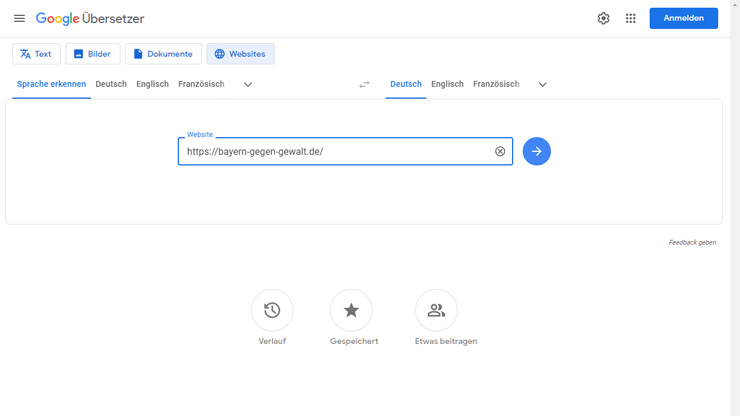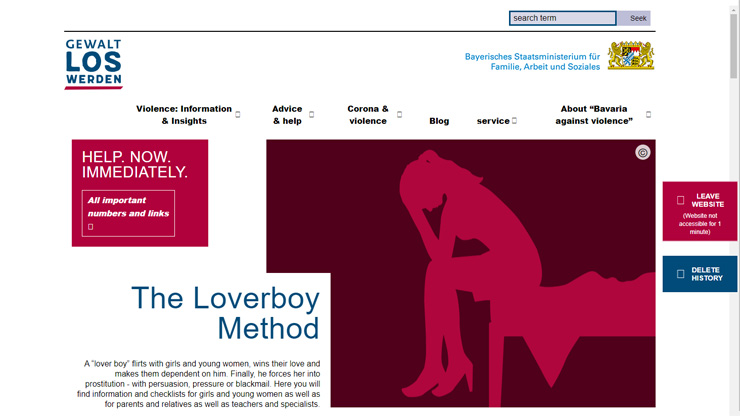
Violence: information in English
What is violence, actually? Have I been affected by violence myself? What can I do if someone in my environment experiences violence? On this page, you will find more information about violence, along with hotlines that provide complimentary and confidential support and guidance.
How does translation with Google Translate work?
On this page, you will find important content of this website in English. Looking for more information – in English or in your native language? Tools like Google Translate can translate the complete website or selected subpages for you. (Exception: the contents of the help search cannot be translated by digital tools. Therefore, you can find important advice hotlines at the bottom of this page.)
Translation into your preferred language: how Google Translate works
- Open translate.google.com in your browser.
- Select the “Websites” tab at the top. An input window will then open.
- Copy the URL of the website or subpage into the input window, for example: https://bayern-gegen-gewalt.de
- In the menu, click on the language you would like to translate into, for example into “English”.
- Click on the arrow. Now a window will automatically open containing the website in your desired language.
What is violence?
On this website, we provide information about violence that people exert against others to intimidate, dominate, hurt or kill. This (“personal” or “direct”) violence can come from one or more people and can be directed against one or more individuals or even an entire group. Many acts of violence are punishable by law. Perpetrators face the possibility of fines or imprisonment.
Those employing violence often want to gain power over others, experience a sense of strength, boost their ego, exert influence, exercise control and dominate others. This is especially true in forms like psychological, sexual and domestic violence.
What forms of violence are there?
If the word “violence” conjures up images of kicks or punches, you are accurate in your perception. But disparaging words or degrading images, for example, can do just as much damage as a fist. They have an invisible effect on the emotions and on the soul. Threats, pressure and coercion are also forms of violence. Violence not only occurs in direct encounters between people, but also in writing, for example through a threatening letter or e-mail, on the telephone and increasingly on the internet, especially in social media. In the following, we provide a brief overview of various forms of violence:
Physical violence is defined as any attack on a person’s body or health, for example pushing, kicking, hitting, (deliberately) scalding, poisoning or injuring another person with a weapon. Regardless of whether it takes place between strangers or within the family, physical violence is forbidden in Germany. Parents are not allowed to beat their children (or lock them up, for example); men are not allowed to beat their wives.
Psychological violence (or mental or emotional violence) takes many forms, ranging from name-calling, taunting and humiliation to threats and blackmail. Stalking and bullying also count as psychological violence. Psychological violence is “invisible”. From the outside, one can usually neither see the act of violence nor its consequences. For this reason, it is often difficult (for the people affected) to prove they have been subjected to psychological violence and (for those around them) to recognize the violence from the outside. Counselling centres can help victims of violence to detach themselves from a violent relationship and come to terms with a violent experience.
Sexual violence refers to sexual acts that are inflicted against another person’s will – or when the person cannot either consent or refuse (for example, due to being unconscious or not understanding what is happening). Sex with anyone under the age of 14 is always considered violence – even if the child appears to “agree”. Sexual violence ranges from sexual harassment (lewd comments, catcalling/whistling, groping) to rape. Making another person submissive with knockout drops and then raped by a date or stranger? This also occurs. However, sexual violence happens much more frequently in marriages or partnerships. Good to know: no one has a right to your body, and no one may force sexual acts upon you – not even your husband or wife, for example.
Digital violence happens everywhere people meet online. It ranges from cyberbullying and hate speech to cyberstalking and cybergrooming (in other words, contacting children online with the aim of sexually abusing them). Digital violence is often closely linked to attacks in the physical world. Hate speech is directed against individuals or groups, for example against LGBTIQ people, individuals with a migration background, people of the Muslim or Jewish faith, or women. Almost all 14 to 24-year-olds have experienced hate speech.
In some countries around the globe, girls are circumcised. These often life-threatening procedures mutilate their sexual organs. These women suffer severely from the consequences for the rest of their lives. In Germany, female circumcision (FGM) is prohibited. However, due to immigration and flight, more and more girls and women affected by this practice are living in our country. Offers of assistance have three goals: 1. to help girls who are threatened by FGM. 2. to educate families about FGM. 3. to support circumcised women, both psychologically and medically.
Forced prostitution means that girls or women (more rarely, but also boys, men or transgender persons) are forced to offer sexual services against their will – for example in a brothel, a hotel room, a private flat or on the street. Frequently, difficult economic conditions in the countries of origin are exploited, with prostitution being presented as a good way to earn money. Or loverboys pretend to be in love with girls or young women – only to force them into prostitution later. Important to know! Are you being forced into prostitution? It is not you who is liable to prosecution, but instead those individuals who are forcing you to do it! There are counselling centres that can inform and support you.
If the bride, groom or both spouses are forced to marry, it is called a forced marriage. In Germany, this practice is forbidden – as are child marriages: only people over the age of 18 are allowed to marry in Germany. Young people who are threatened by a forced marriage or have already been married against their will can be assisted.
Is my husband allowed to hit me? Are my parents allowed to hit me?
No: nobody has the right to subject you to violence in any way!
- Whether husband or boyfriend, supervisor or landlord, no one is allowed to hit you, mistreat you, lock you up, threaten you, blackmail you or force you to have sex. No one may forbid you to leave the house, for example.
- Parents (or other relatives) are also not allowed to beat, lock up or otherwise mistreat their children. Not even if a child has disobeyed or received bad grades, for example.
Are you in danger? Or is someone you know? Dial the police hotline: 110.
Have I experienced violence?
You may have experienced violence if you answer YES to the following two questions:
- Has someone hurt you physically or emotionally?
- In doing so, did he or she act deliberately and on purpose (that is, not by accident)?
Even if the perpetrator believes he or she is in the right: whether an act is violence can only be assessed by the victim. Violence is what feels wrong to YOU – not necessarily to the perpetrator.
Sometimes it is difficult to draw clear boundaries. Was it a well-intended compliment – or sexual harassment? A thoughtless remark in an argument – or deliberate, methodical disparagement? Especially in the case of psychological violence, often only the victim knows the pain and the extent of the injury. In the case of violent acts such as sexual harassment, bullying, cyberbullying, stalking, cyberstalking or gaslighting, it makes sense to document all threats and attacks. With saved e-mails, screenshots of posts or your own notes, you can prove that you were repeatedly and deliberately stalked, threatened and/or even attacked.
Another person is experiencing violence. What can I do to help?
Example: domestic violence
You suspect that your neighbour (or an acquaintance, friend, colleague, classmate...) is being abused by his or her partner? Here’s how you can help: Talk to your neighbour, for example in the stairwell or in the supermarket. Chat a little, for example about the weather or their children. Ask how they are doing. Then sensitively direct the conversation toward your suspicions. Do not put pressure on your neighbour. Offer a sympathetic ear and help. Point out offers of help to your neighbour.
Violence: counselling & help
-
-
Have you experienced violence? Would you like to support a person who is affected by violence? You will find central points of contact here. They can offer initial orientation on the topic and, if necessary, refer you to further services. Note: the websites are in German. Advice in English or other languages cannot be guaranteed.
-
110
Police hotlineAre you being acutely threatened? Or is someone in your environment? Call the police immediately.
- Hotline for violence against women
-
-
-
Hotline for violence against men
Hotline (across Bavaria) 0800 1239900. Advice also provided by e-mail and chat.
-
Youth helpline for children and young people
Hotline (nationwide) 116 111. Advice also provided by e-mail and chat.
-
Strong! Support, information and counselling for LGBTIQ people
Hotline (across Bavaria) 0800 00 112 03. Advice also provided by e-mail and chat. Strong! is a contact point for LGBTIQ people who have experienced violence or discrimination.
-
Hotline for violence against men

